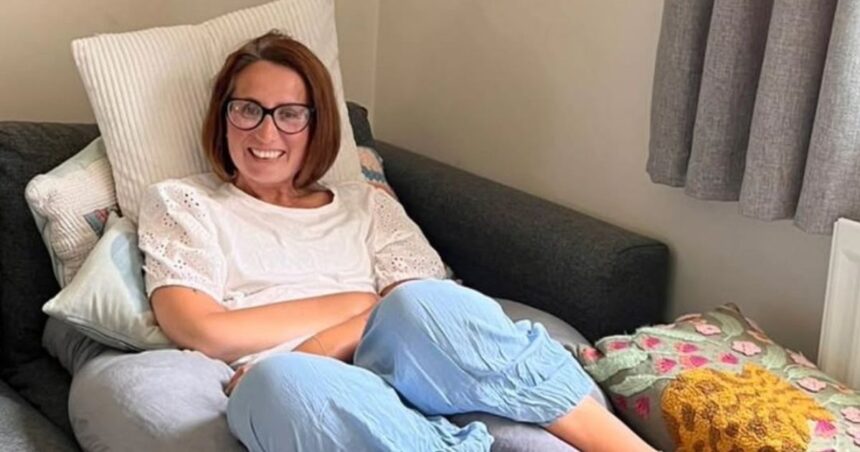In one of the rare cases, a mother in
England
decided to end her life with dignity, giving way to the debate of end-of-life choices in the
UK
.
Emma Bray was a 42-year-old mother from Barnstaple, England. After battling terminal motor neuron disease bravely for years, she finally made a courageous and painful decision to end her life. The path she chose was through voluntarily stopping eating and drinking (VSED).
A post shared by @stupid_mnd
Bray chose this path not out of despair or anger, but out of love. She did this for her two teenage children. She gave her kids the best of her life and wanted to shield them from witnessing the brutality of her final stages of physical deterioration. As a mother, this was the most difficult decision of her life.
The UK has no provision for end-of-life choices. There is a stark lack of legal access to medically assisted termination of life. But with Bray’s passing, there is a renewed conversation.
Bray’s passing has sparked renewed debate around end-of-life choices in the UK. Her story shows the emotional, physical, and ethical complexities a person faces when they are terminally ill, how they lose their authentic self, their dignity, and their right to life.
Bray’s disease stripped her of humanity. Motor neuron disease is a progressive neurological disorder. It attacks the nerves controlling the movement of the body. Over time, individuals with MND lose their ability to move, eat, speak, and eventually breathe.
And suffers…’suddenly’😪💔
*Emma Bray-42-England
*Mom of two teens
*June 1, 2025
*Diagnosis 2023: Rare form of Motor Neurone Disease
*”I’ve had four different health professionals tell me I’ve got the worst disease possible”
*MND is a fatal neurological condition, attacking…
pic.twitter.com/8z79q824XH
— cheri maday (@resilient333)
June 2, 2025
For Emma, the disease robbed her of her mobility and then her independence. She had been battling this for years, but by mid-2024, she started to lose herself to the disease. She could no longer use her limbs. She was struggling to breathe and was in constant discomfort.
“I feel like I’m losing the essence of me,” Bray wrote in one of her final public messages.
Bray often talked about the emotional toll her illness was taking. She said this was detrimental for her kids more than it was for her. Her kids were young teenagers of 14 and 15, grappling with the idea of losing their mother one day, when they saw her wasting away every day.
She was worried about the psychological damage all of this would have on them. She didn’t want her children to witness her eventual choking or gasping for air. Her decision to end her life through VSED was not an escape but an act of maternal protection.
“My last bit of parenting I can do is to limit the suffering and trauma they have to witness,” she said.
Emma Bray was not silent about her circumstances. She did not give up quietly in her house. She fought for her dignity. She became a prominent advocate for Dignity in Dying. It is an organization campaigning for the legalization of assisted dying in the UK.
We are deeply saddened to hear of the death of Emma Bray.
Emma was diagnosed with MND in 2023 and recently made the decision to stop eating and drinking, rather than suffer through the final stages of the disease.
We extend our heartfelt condolences to her family and friends.
pic.twitter.com/4k5lHRyxuM
— Dignity in Dying (@dignityindying)
July 16, 2025
She supported the
Assisted Dying Bill
, which would give terminally ill patients a legal right to choose medically assisted death. The bill mentions some conditions, such as the prognosis must state that the patient has 6 months or less to live.
Medically assisted dying remains illegal in the UK; that’s why Bray had to opt for VSED. It is a legal but grueling method of ending one’s life. The process took place under hospice care and was, according to those close to her, peaceful.
VSED is obviously a difficult path to choose but it gave Emma a level of control over her final moments. A control that she had been lacking for a long time. It also gave a chance to say goodbye to her family on her own terms. She wanted her daughters to remember her as a happy mother.
On July 14, Emma shared a scheduled farewell message on Instagram. She thanked her followers and loved ones. She also encouraged others to carry out acts of kindness in her memory and to “plant a tree, give blood, or donate to a food bank.”
A post shared by @stupid_mnd
She ended her message with a moving call: “Ask yourself, what would Emma do?”
Bray’s death has magnified the need for legal reform. Advocates have argued that her story shows the suffering endured by those who are already battling the most difficult battles of their lives and then are forced to make impossible choices.
For many people, Emma Bray will be remembered as a symbol of dignity and courage.






